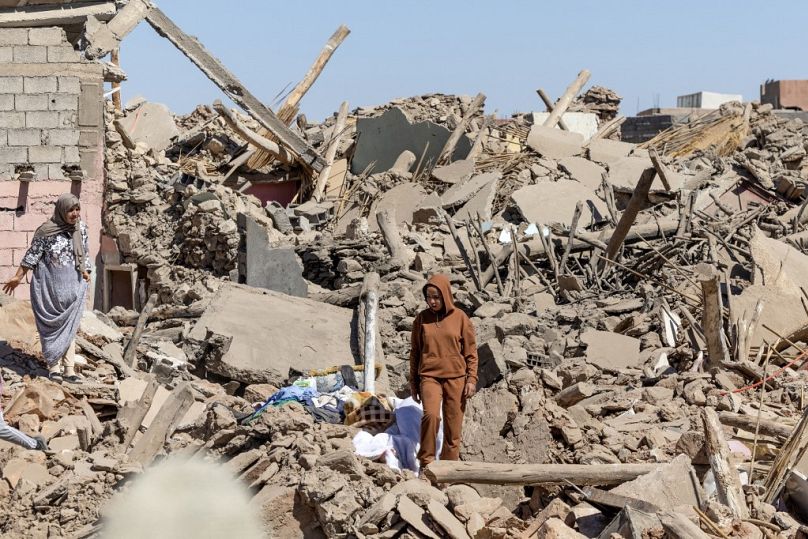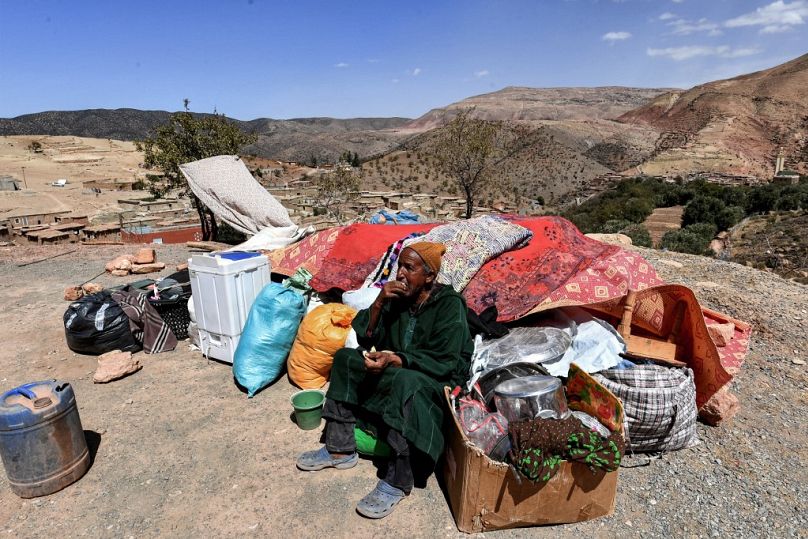Morocco was struck by the strongest earthquake in more than a century on Friday.
Three days after a devastating earthquake, Moroccans face immense destruction alone, with aid arriving at a snail pace.
 ADVERTISEMENT
ADVERTISEMENT
 ADVERTISEMENT
ADVERTISEMENT
Friday's quake is known to have killed more than 2,800 people, making it the deadliest in more than six decades.
This number is expected to rise even higher, as more bodies are pulled from the rubble.
Rescuers from around Europe have joined Moroccan teams searching for survivors in remote areas of the High Atlas Mountains, with the epicentre of the earthquake some 72 km southwest of the Moroccan capital, Marrakesh.
The disaster destroyed homes, blocked roads and wiped entire villages off the map.
In one of the most affected parts of Moulay Brahim, a village one hours drive from Marrakesh, more than 450 homes lie in ruins and around 20 locals are thought to have died, including several children, reports AFP.
“We have received aid... but it is insufficient,” says Mohammed Bouaziz, 29, who is part of a local organisation that is trying to help more than 600 homeless people.
Supported by a few donors in the region, his organisation has set up nine makeshift camps, where women and children shelter together, while men work to clear the rubble with their bare hands.
The most courageous venture inside smashed buildings to salvage what they can, despite the risks involved.
Moroccan TV reported on Monday that the death toll had risen to 2,862 with 2,562 injured.
The United Nations estimated 300,000 people were affected by the overnight 6.8 magnitude quake, with some Moroccans now saying they feel abandoned by the authorities.
"The state didn't come, we didn't see anyone. After the earthquake, they came to count the number of victims. Since then, there hasn't been a single [visit]. No civil protection, no aid. Nobody is here with us," said Mohamed Aitlkyd, a resident of Missirat, a small town more than 300 km from the capital.
"We feel abandoned here... Our houses have collapsed and we no longer have any shelter. Where are all these people going to live?" added one of his neighbours, Khadija Aitlkyd.
That many homes are made from mud and clay has amplified the catastrophe.
'Everything is gone'
Unable to hold back the tears, Thami Baddi, a 34-year-old man who saved up for 15 years to build his house, told reporters: "Everything is gone."
He feels very lucky to have found his wife, who was 9 months pregnant, and his two children alive under the rubble, after rushing home Friday evening.
"When I saw the state of the house, I thought that none of them would get out alive."
His wife gave birth on Saturday evening in a emergency medical centre in the region, which has only three beds.
But now they need him to take her out - a prospect that terrifies him.
"How am I going to cope with a one-day-old infant in a tent where it is cold in the evening and hot in the sun."
The weather forecasts do not reassure him. "Heavy to moderate" stormy showers are predicted from Thursday in the affected provinces.
Concerns about the speed of aid
International aid crews were poised to deploy Sunday evening, but some grew frustrated waiting for the government to officially request assistance.
The Moroccan government says it has accepted assistance from four countries so far - Britain, Spain, Qatar and the UAE - with France saying it would send 5 million euros Monday morning.
“Morocco is a sovereign country and it is up to it to organise relief,” said French Minister for Foreign Affairs Catherine Colonna, detailing that Rabat had not refused any help.
She warned against creating “false controversy” at a time when “people need help”.
In a statement on Monday afternoon, Morocco's Ministry of the Interior said "public authorities are continuing their efforts to rescue, evacuate and care for the injured, and are mobilising all the necessary resources."
It is a struggle to access rural communities in the mountains, with roads blocked by fallen rocks and soil.
Aftershocks on Sunday, measuring 3.9 on the Richter scale, have rattled nerves in affected areas. Many people fearing more tremors - or now homeless - are sleeping outside.
Most of the dead are currently in the Al Haouz district in the High Atlas Mountains, according to Moroccan officials.
Flags were lowered across Morocco, as King Mohammed VI ordered three days of national mourning starting Sunday. He also called for mosques to hold prayers Sunday for the victims, many of whom were buried immediately after the disaster hit.












